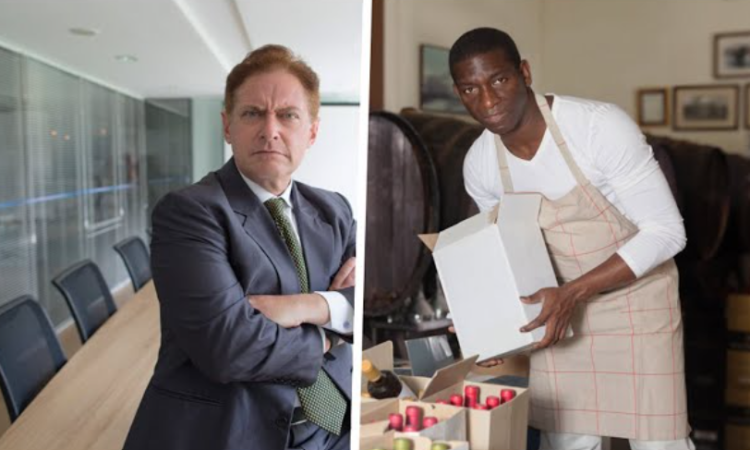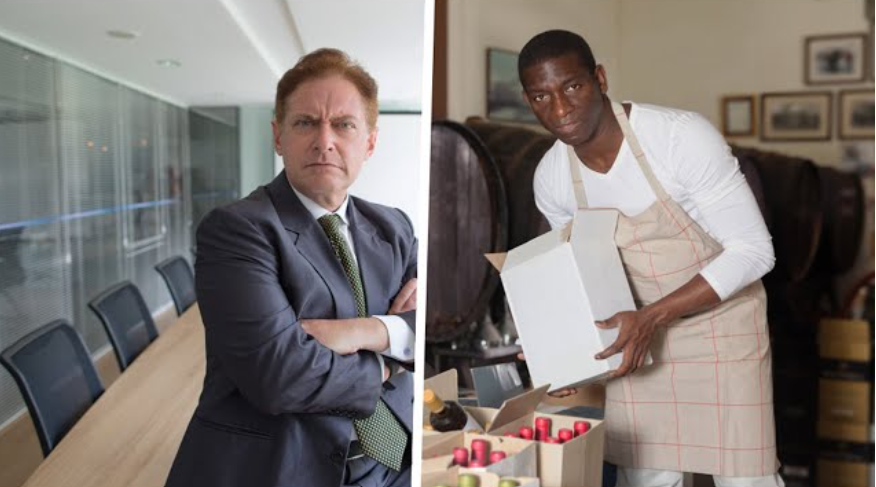White CEO “Accidentally” Forgets Wallet To Test Staff. He Faints When He Sees Employer Doing This

Henry, the CEO of a renowned tech company, decided to conduct an Integrity test on his staff, disguising himself as a regular customer. He accidentally left his wallet at home, curious to see how his employees would react to his dilemma. However, the situation took an unexpected turn when he observed one of his employees, a young diligent man named Carter, spring into action.

What Carter did next was so astonishing that the CEO found himself struggling to stay on his feet, overwhelmed by disbelief. Henry stood at the cash register, full of disbelief; he had just told Carter that he had forgotten his wallet, expecting him to make a point out of it. But instead of refusing to serve Henry, Carter did something that blew him away. Never in a million years had he expected something like this from his employees.
“Are you serious?” Henry asked. Carter responded with a confused look on his face. “Of course,” he said as he resumed doing his job. Henry suddenly began to feel lightheaded. This was not at all how he expected this encounter to go. He even had yet to reveal his true identity. If only Carter would understand, this could go either way. Henry had to sit down for a moment. He had to make a very difficult decision that he hadn’t prepared for at all. If he had known Carter would do something like this, he would have disguised himself way sooner.
But why did Henry disguise himself as a customer? What did Carter do after realizing that Henry had no wallet? And what is the difficult decision Henry had to make?
Happy Day Coffee had been Henry’s pride and joy for many years. It had grown from one simple coffee shop to a business with many different locations. It was a lot to keep track of, especially with how many employees he had. Luckily, all his coffee shops were doing well, at least except for one. Happy Day Coffee Illinois seemed to have a lot less profit than his other chain. Henry had tried to figure out how that could be. He had his suspicions, but he couldn’t act on them without proof. That’s why he decided to visit the coffee shop and experience its operations firsthand.
His assistant, aware of his plan, expressed doubts but still helped him with his disguise, including a mustache and darker hair. Borrowing her car, he parked in front of the shop. His heart raced as he arrived, hoping not to be recognized. The bustling shop had a line outside, prompting him to join. Inside, everything appeared well-managed, with satisfied customers and a warm atmosphere. Sitting at a table, Henry ordered from a server named Carter and observed the environment.
Despite the apparent success, he remained puzzled about the shop’s low profits. As he waited for the check, Henry considered visiting more locations. His attention was drawn to an employee acting suspiciously behind the counter. Henry waited for the employee to surface, noting her odd behavior in his notebook. When Carter returned with the bill, Henry prepared to reveal his wallet predicament but was interrupted by a problem at the cash register.
Carter handled the situation with finesse, prioritizing customer service over Henry’s issue. Watching Carter in action, Henry felt a mix of admiration and concern, realizing Carter’s leadership qualities. Deciding to approach the register, Henry overheard employees venting about their wages before Carter called him forward, leaving Henry torn between addressing their concerns and explaining his forgotten wallet.
The CEO’s dual role as a customer added complexity to the situation. Standing before Carter, Henry struggled to reconcile his newfound knowledge of employee grievances with his wallet dilemma. With Henry’s admission of a forgotten wallet, tension hung in the air, intensified by Carter’s unreadable expression. As Carter retreated to the back room, leaving Henry to contemplate his next move, the CEO’s inner turmoil intensified, driven by curiosity and concern.
Henry slipped into the back room, where he overheard Carter discussing charitable initiatives. Surprised by the depth of Carter’s actions, Henry retreated just as an employee entered, providing cover for his intrusion. Henry followed the employee’s directions to the bathroom, using the time to solidify his cover story. Returning to the register, he found Carter waiting, their interaction now imbued with a deeper understanding.
Carter acknowledged the unusual situation with empathy, offering a solution to Henry’s forgotten wallet dilemma. Henry, wary of crossing professional boundaries, gently steered the conversation away from personal favors. After a brief struggle, Carter proposed a solution that intrigued Henry, leading them to the break room marked “employees only.” Carter’s playful smile hinted at an unconventional resolution.
As Carter suggested Henry work off his coffee through dishwashing, Henry hesitated, caught between astonishment and consideration. The tension in the room thickened, awaiting Henry’s response. Suddenly, Carter burst into laughter, the sound filling the small room.
“I’m just kidding!” he exclaimed, clapping Henry on the back. The tension dissolved, though Henry was left with a mix of relief and lingering uncertainty. Carter’s joke had lightened the mood, but Henry couldn’t shake off the feeling that this day had taken him on an unexpected journey far beyond what he had planned.
While the laughter faded, Henry’s eagerness to settle the payment issue without further gest was evident. He straightened up, signaling his readiness to move past the humor and find a real solution. Carter, catching on to Henry’s mood, nodded, understanding the shift back to the matter at hand was necessary. Henry couldn’t mask his frustration over the brief detour into jest. He appreciated a good joke, but the situation at hand was pressing.
He conveyed his need for a serious resolution, hoping Carter would recognize the urgency of the matter without further delay. The conversation steered towards genuinely resolving the payment issue. Carter, now fully aware of Henry’s desire for closure, began outlining a proposal that seemed to account for the unique circumstances of the day. Henry listened intently, hopeful that this conversation would finally provide the resolution he sought, eager to see how his accidental test of integrity would conclude.
Carter, with a serious tone, finally addressed the issue. “Don’t worry about the coffee,” he said, dismissing the payment altogether. This unexpected resolution sparked Henry’s interest even more, hinting at depth to Carter’s character and the decisions he made running the coffee shop. This decision led Carter to share about his contributions to the local homeless shelter, explaining how for every coffee sold, he also gave one to the homeless.
Henry listened, intrigued by the unexpected revelation as Carter detailed his commitment to giving back to the community in this unique way. As Henry inquired further, Carter opened up about the logistics of distributing extra coffee to those in need. This practice not only highlighted Carter’s generosity but also provided Henry with a clearer picture of how the coffee shop’s profits were being utilized in a socially responsible manner.
Henry began to understand the bigger picture, connecting Carter’s charitable actions with the discrepancies in the shop’s profits. The realization dawned on him that the lower than expected financial returns were a direct result of Carter’s decision to support the homeless, showcasing a sacrifice for the sake of community welfare.
Carter, sensing Henry’s newfound understanding, elaborated on his motivations. He spoke of his values and the impact he hoped to make, revealing a profound sense of responsibility towards those less fortunate. This conversation illuminated Carter’s character in a new light, providing Henry with insight into the genuine compassion driving the shop’s operations.
Henry, profoundly moved by Carter’s selfless actions, began to reconsider his
earlier doubts about the shop’s performance. The revelation of Carter’s charity work forced Henry to see beyond mere numbers, acknowledging the invaluable impact of giving back to the community.
Feeling a strong connection to Carter’s principles, Henry decided it was time to reveal his true identity. “I’m actually the CEO of Happy Day Coffee,” he admitted, watching closely for Carter’s reaction. This moment of truth marked a turning point in their conversation, bridging the gap between employer and employee.
Carter’s response was a complex blend of surprise and worry. The shock of learning Henry’s true identity quickly gave way to concern over what this revelation might mean for the shop’s charitable actions. Would this new understanding compromise the initiative he held so dear?
Henry found himself deeply considering the delicate balance between running a profitable business and fulfilling social responsibilities. Carter’s dedication to the community had ignited a spark in Henry, prompting him to re-evaluate the company’s priorities and how they could genuinely make a difference.
Motivated by Carter’s example, Henry resolved to support and integrate the coffee for the homeless initiative into Happy Day Coffee’s broader mission. He saw this as an opportunity to redefine the company’s impact, aligning business success with social contribution and laying the groundwork for a future where profit and purpose could coexist harmoniously.
Henry made the decision to not only support but also involve Carter directly in expanding the charity initiative across Happy Day Coffee. This move marked a significant shift in the company’s direction, aiming to blend its business model with a strong commitment to social responsibility, thereby setting a new standard for the company’s future operations.
By endorsing the charity initiative, Henry signaled a profound commitment to incorporating social responsibility into the core of Happy Day Coffee. This endorsement was not just a statement but a pledge to integrate giving back into every cup of coffee sold, reinforcing the company’s dedication to making a positive impact on the community.
Carter’s involvement in the charity initiative not only recognized his contributions but also elevated his role within the company. This evolution highlighted the significance of his initial actions and set him as a key figure in driving the new charitable mission forward, exemplifying the power of individual initiative in shaping corporate ethos.
The collaborative effort between Henry and Carter became a beacon of corporate philanthropy, showcasing how a partnership between leadership and employees can foster a culture of generosity and social awareness. This partnership demonstrated the potential for businesses to lead with compassion and contribute meaningfully to society.
The story of Happy Day Coffee culminated in the adoption of a new business model that fundamentally integrated the act of giving back into its core value. This transformative decision not only redefined the company’s identity but also inspired others in the corporate world to consider how they too could merge profitability with purpose, ensuring a legacy of positive impact and community support.




